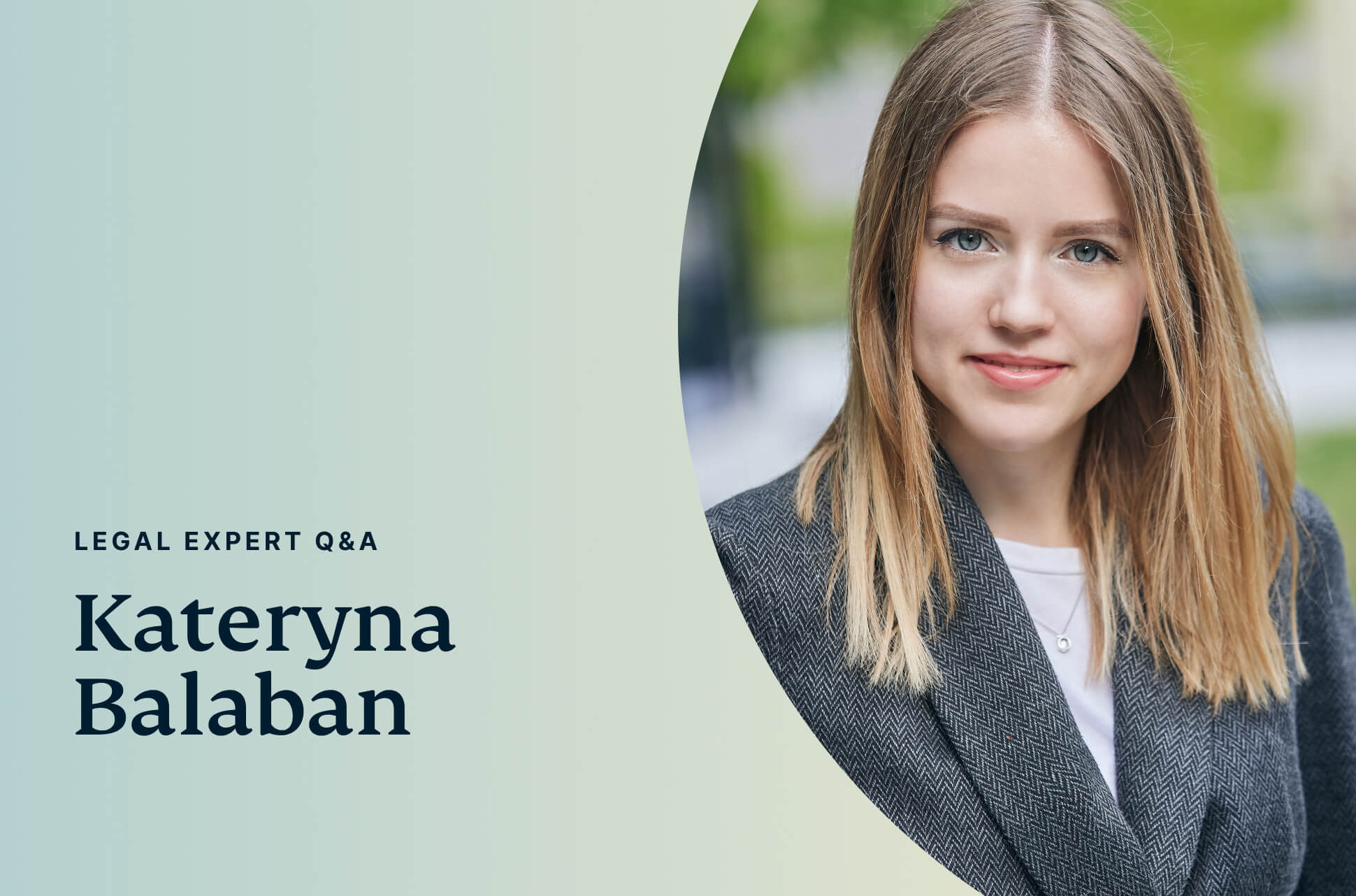Q&A: Kateryna Balaban, on how VPNs are helping protect refugees


Kateryna Balaban is the Managing Director of Linking Help, the NGO behind UA.SUPPORT—an international pro bono legal platform and ExpressVPN partner that connects Ukranian refugees and asylum seekers requesting legal aid with accredited legal professionals.
We speak with her about the work her organization is doing for displaced persons across the world and the role that VPNs play in protecting their privacy and safety online.
Tell us more about the origin story of UA.SUPPORT, your involvement, and how it’s evolved since its launch in March 2022?
I was in Ukraine looking for internships abroad when the Russian invasion of Ukraine began. I received a call from a law firm based in the Czech Republic that said they needed a Ukrainian-speaking lawyer to manage their new refugee legal aid project called UA.SUPPORT. So, on March 6, I left Ukraine on an evacuation train to join the team in Prague. We started from scratch, reaching out to lawyers and registering them on the platform. The counselors could then select cases and communicate with refugees seeking legal aid.
Initially, around 50 lawyers from 10 countries were involved—but over time, we grew to around 300 lawyers in 30 countries, helping more than 3,000 people. It was a steep learning curve for us, as we didn't have much experience with this kind of project, but we tried everything we could think of, including reaching out to embassies and NGOs, to build our community of volunteers.
I now lead the project, alongside colleagues who share our commitment to helping refugees and asylum seekers. I'm proud of what we’ve achieved so far, and I'm excited to see how we can continue to develop and expand our work in the future.
With an increasing number of volunteers, are you now able to extend aid to refugees from countries other than Ukraine?
Yes, we can! The more we grew, the more we realized that we could expand our reach to help anyone in need. We have created a non-profit organization called Linking Help, which encompasses the original platform and allows us to incorporate further projects for specific countries or regions. Linking Help will provide assistance to anyone who requires it, not just Ukrainian refugees.
For example, through Linking Help, we want to assist with relief efforts for the survivors of the recent earthquake in the Middle East. We are constantly striving to become a bigger organization so we can help more people.
ExpressVPN recently partnered with UA.SUPPORT by providing free VPN service. How is VPN access benefitting the NGO’s volunteer lawyers and clients?
The partnership has been crucial for our clients and lawyers to communicate without fear of their personal information being compromised. We can ensure the privacy and safety of asylum seekers and refugees, while also protecting the legal advice and services provided by our team.
It’s vital for our clients and volunteers to feel secure and know that their personal information is protected when they’re online. This improves productivity and collaboration, making our work more effective.
It’s vital for our clients and volunteers to feel secure and know that their personal information is protected when they’re online.
A VPN also ensures that links and files are downloaded over secure connections, which is especially important for our organization, where many sensitive documents are shared.
Using a VPN is also critical when working in public spaces, where general Wi-Fi can be a potential risk. With VPNs, lawyers can work safely from any location, as well as send and receive files without worry.
What do you see as the main threats to digital privacy and security for refugees?
In my role, I’m constantly thinking about the potential dangers that this vulnerable group faces on a daily basis, including the risks posed by digital threats. Refugees are particularly susceptible to scammers and hackers, who can easily manipulate them.
Having personally witnessed scammers calling people while pretending to be government officials and requesting personal information, I am aware of how dangerous these fraudulent attempts can be. Unfortunately, refugees and asylum seekers, who often lack access to reliable sources of information, are particularly vulnerable to cyberthreats. Communicating securely can also be a challenge for them, making them more vulnerable than others.
Hackers may also target them for political reasons. In fact, we once experienced a bot attack on our website. This highlights the potential threat of certain governments trying to hack the details of refugees in an attempt to track and locate them.
In my role, I’m constantly thinking about the potential dangers that this vulnerable group faces on a daily basis, including the risks posed by digital threats. Refugees are particularly susceptible to scammers and hackers, who can easily manipulate them.
Overall, it’s important to take these threats seriously and ensure there are measures in place to protect the digital privacy and security of refugees and asylum seekers.
How can technology such as VPNs help improve access to justice and legal support for refugees and asylum seekers?
As someone who has worked with refugees for a while now, I know that one of the biggest concerns is the security of their personal and sensitive information. This is especially important when communicating with lawyers and sharing important documents online.
Technology like VPNs can prove to be immensely valuable in protecting this information. By utilizing a VPN, we can secure our communications and minimize the chance of sensitive information being leaked or stolen.
VPNs can also help our asylum seekers apply for job opportunities from anywhere in the world and give our volunteers access to essential online services. For example, I once needed to access information on a government website in the Czech Republic while I was out of the country. Using a VPN, I was able to download the documents from the site and help my clients.
Overall, I think that VPNs are a valuable tool for those working with vulnerable populations, including refugees, asylum seekers, journalists, and activists. By providing a secure and private connection, VPNs can help protect digital rights and ensure that everyone has access to critical information and services.
UA.SUPPORT has created a platform that uses artificial intelligence (AI). How does it work?
Our platform is designed to make it easier for website visitors to get the legal assistance they need. It is designed as an agile clearing house—basically, it’s an online platform that has the facade of a website, but it is a smart system that handles, sends, reports, stores, sorts, and analyzes requests.
When visitors fill out the request form on our website, the information is categorized by country and the specific issue that they are facing.
VPNs are a valuable tool for those working with vulnerable populations, including refugees, asylum seekers, journalists, and activists.
Without this platform, it would be difficult for our in-house team to manage all of the incoming cases that come our way. With the help of a smart system, we can categorize and organize cases much more efficiently. Our pro bono lawyers are notified of the new requests. They can monitor cases and decide which one to select. Then, the lawyers will contact the requesters directly and start working with them.
Thanks to this platform, we can also see which languages a person speaks, the summary of their case, and other important details. This allows us to work more efficiently and provide better assistance to those in need.
What other digital technologies do you think could help the plight of those who must seek out new homes?
Websites and mobile applications that gather critical information on legal aid, job opportunities, accommodation, and medical care would be really helpful. It would be great to have a centralized platform where people can share information and experiences. Identification technology that securely registers refugees and asylum seekers, and stores their documents, as well as prevents identity theft, would also be a game-changer.
How can our readers get involved with UA.SUPPORT and support the cause of refugee and asylum seeker rights?
First and foremost, we welcome any kind of volunteer, not just lawyers. Even marketing specialists and those in business development can help us with exposure and outreach.
Another way to support us is by sharing our social media posts and spreading the word about our website and the work we do. Social media is crucial in helping us reach more people who need our help.
Lastly, we are an NGO that relies on donations to keep our mission going. So, making a financial contribution will further assist us in our efforts of providing legal aid and justice to those in need. Every little bit helps us make a huge difference in the lives of refugees and asylum seekers.
Take the first step to protect yourself online. Try ExpressVPN risk-free.
Get ExpressVPN



